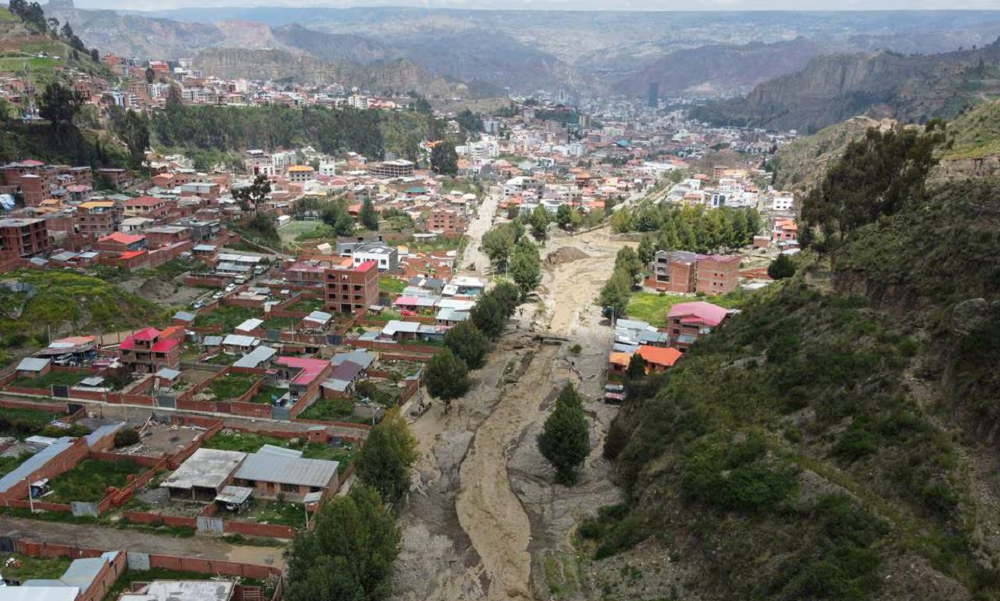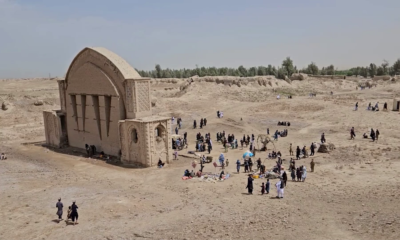Climate Change
G7 meets for climate talks, faces pressure on fossil fuels

G7 allies met Saturday for two days of “difficult” climate talks in northern Japan, facing pressure to show progress on key fossil fuel commitments in an example to other major economies including China.
Campaigners have warned climate and environment ministers from the leading developed countries against backsliding on pledges to shift away from coal and natural gas at home and abroad, AFP reported.
But a leaked third draft of a statement to be issued on Sunday at the meeting in Sapporo has relieved some experts, who had feared a more ringing endorsement of the need for overseas gas investments.
“All in, given low expectations, it now seems a better outcome than many expected,” said Ed King from the climate-oriented communications firm GSCC.
The ministers want to show unity after a major United Nations climate report warned last month that 1.5 degrees Celsius of global warming would be seen in about a decade. It called for “rapid and far-reaching” action to keep increases within relatively safe limits.
However, as the energy crisis sparked by the Ukraine war squeezes G7 countries including Japan, Germany and the United States, divisions have arisen among the bloc.
A French government source earlier described “difficult” discussions, but the country’s energy transition minister Agnes Pannier-Runacher painted a brighter picture of Saturday’s talks.
She hailed “significant progress” in the joint statement, which she said sent “positive signals for the upcoming G20 and the upcoming COP” in Delhi and Dubai.
“For the first time ever, the G7 said that we must accelerate the ‘phasing out’ of all unabated fossil fuels,” and that there should be no more new coal-fired power plants, Pannier-Runacher told reporters.
‘Critical decade’
The latest draft statement, seen AFP calls on nations to take action “in this critical decade,” urging a peak in global greenhouse emissions by 2025 at the latest.
Experts say this language is aimed at China, the world’s largest carbon emitter, which is targeting a peak in its carbon emissions by 2030.
The draft also stresses the “urgency” of slashing global emissions by 60% by 2035 from 2019 levels, as recommended by the U.N.’s IPCC panel of climate experts.
Language on fossil fuels has been more contentious, however.
Britain and France proposed new concrete targets, while other members including this year’s G7 president Japan, which is heavily dependent on imported fossil fuels, and the United States have pushed a more conservative line.
Ministers pledged at the last G7 climate ministerial in Germany to end new direct public support in 2022 for overseas fossil fuel projects that do not offset emissions.
But this was watered down a month later when G7 leaders said the “exceptional circumstances” of Russia’s war in Ukraine made gas investments “appropriate as a temporary response.”
Japan had sought language to solidify that exception, but instead the draft statement calls for “gas demand reduction” and sets multiple parameters around such investments, AFP reported.
Hydrogen controversy
Coal is another hotly debated topic, with different degrees of ambition put forward by Japan, the United States and Britain on global efforts to phase out fossil fuels in electricity systems.
Japan had sought G7 recognition for its controversial strategy of burning hydrogen and ammonia alongside fossil fuels to reduce carbon emissions – which climate activists say only serves to extend the lifespan of polluting plants.
The draft statement simply notes that “some countries are exploring” the potential of the two fuels in the journey to net-zero emissions, adding that this should be “aligned with a 1.5C pathway.”
Climate Change
UN sounds ‘Red Alert’ as world smashes heat records in 2023

Every major global climate record was broken last year and 2024 could be worse, the World Meteorological Organization (WMO) said on Tuesday, with its chief voicing particular concern about ocean heat and shrinking sea ice, Reuters reported.
The U.N. weather agency said in its annual State of the Global Climate report that average temperatures hit the highest level in 174 years of record-keeping by a clear margin, reaching 1.45 degrees Celsius above pre-industrial levels.
Ocean temperatures also reached the warmest in 65 years of data with over 90% of the seas having experienced heatwave conditions during the year, the WMO said, harming food systems.
“The WMO community is sounding the Red Alert to the world,” said WMO Secretary-General Celeste Saulo, who took over the job in January.
“What we witnessed in 2023, especially with the unprecedented ocean warmth, glacier retreat and Antarctic sea ice loss, is cause for particular concern.”
She later told reporters that ocean heat was particularly concerning because it was “almost irreversible”, possibly taking millennia to reverse.
“The trend is really very worrying and that is because of the characteristics of water that keep heat content for longer than the atmosphere,” she said.
Climate change, driven by the burning of fossil fuels, coupled with the emergence of the natural El Nino climate pattern, pushed the world into record territory in 2023, read the report.
WMO’s head of climate monitoring, Omar Baddour, told reporters there was a “high probability” that 2024 would set new heat records, saying that the year after an El Nino was typically warmer still.
Tuesday’s report showed a big plunge in Antarctic sea ice, with the peak level measured at 1 million km2 below the previous record – an area roughly equivalent to the size of Egypt.
That trend, combined with ocean warming which causes water to expand, has contributed to a more than doubling of the rate of sea-level rise over the past decade compared with the 1993-2002 period, it said.
Ocean heat was concentrated in the North Atlantic with temperatures an average 3 degrees Celsius above average in late 2023, the report said. Warmer ocean temperatures affect delicate marine ecosystems and many fish species have fled north from this area seeking cooler temperatures, Reuters reported.
Saulo, a meteorologist from Argentina who has promised to strengthen global warning systems for climate disasters, said she hoped the report would raise awareness of the “vital need to scale up the urgency and ambition of climate action”.
“That’s why we spoke about the Red Alert because we must care for the people and how they will suffer from these more frequent, more extreme events,” she told reporters. “If we do nothing, things will become worse and that will be our responsibility.”
Climate Change
Pakistan, India and Bangladesh bottom in air quality rankings in 2023

Pakistan remained one of the world’s three smoggiest countries in 2023, as Bangladesh and India replaced Chad and Iran, with particulate matter about 15 times the level recommended by the World Health Organization, data published on Tuesday showed.
Average concentrations of PM2.5 – small airborne particles that damage the lungs – reached 79.9 micrograms per cubic meter in Bangladesh in 2023, and 73.7 micrograms in Pakistan. The WHO recommends no more than 5 micrograms.
“Because of the climate conditions and the geography (in South Asia), you get this streak of PM2.5 concentrations that just skyrocket because the pollution has nowhere to go,” said Christi Chester Schroeder, air quality science manager at IQAir, a Swiss air-monitoring organisation.
“On top of that are factors such as agricultural practices, industry and population density,” she added. “Unfortunately, it really does look like it will get worse before it gets better.”
In 2022, Bangladesh was ranked as having the fifth-worst air quality, and India was eighth.
About 20% of premature deaths in Bangladesh are attributed to air pollution, and related healthcare costs amount to 4%-5% of the country’s GDP, said Md Firoz Khan, an air pollution expert at Dhaka’s North South University.
Indian pollution also increased last year, with PM2.5 levels about 11 times higher than the WHO standard. India’s New Delhi was the worst-performing capital city, at 92.7 micrograms.
Only Australia, Estonia, Finland, Grenada, Iceland, Mauritius and New Zealand met WHO standards in 2023.
The IQAir report was based on data from more than 30,000 monitoring stations in 134 countries and regions.
Chad, the world’s most polluted country in 2022, was excluded from the 2023 listings because of data issues. Iran and Sudan were also taken off the 2023 list.
Afghanistan was meanwhile not included on the list.
Climate Change
In Bolivia, heavy rains prompt authorities to declare state of emergency

Heavy rain in Bolivia’s capital, La Paz, prompted authorities to declare a state of emergency, a government document showed on Sunday, after overflowing rivers destroyed many houses over the weekend.
Bolivian President Luis Arce pledged to send heavy machinery and 3,000 troops to prevent further damage, according to the document, Reuters reported.
Heavy rains caused flooding in several neighborhoods and isolated parts of the city by cutting water, electricity and roads.
“We are deeply concerned by the difficult situation that our municipality in La Paz is going through,” Arce said in a post on social media platform X.
One person died over the weekend in La Paz because of the heavy rains, while nearly 50 people have died in deluges across the country since the rainy season began in January, according to official data.
-

 Sport4 days ago
Sport4 days agoACL draw to be broadcast live on ATN channels
-

 Regional4 days ago
Regional4 days agoIRGC chief warns of harsher response if Israel attacks Iran
-

 Regional4 days ago
Regional4 days agoIran launches retaliatory attack on Israel with hundreds of drones, missiles
-

 Sport3 days ago
Sport3 days agoACL fever grows as fixtures finalized
-

 Latest News4 days ago
Latest News4 days agoContact group on Afghanistan hits roadblock over Pakistan’s gripe with India
-

 Sport4 days ago
Sport4 days agoHetmyer powers Rajasthan win in low-scoring IPL thriller
-

 World4 days ago
World4 days agoUN Security Council to meet Sunday on Iran attack
-

 World3 days ago
World3 days agoUS will not take part in any Israeli retaliatory action against Iran


























